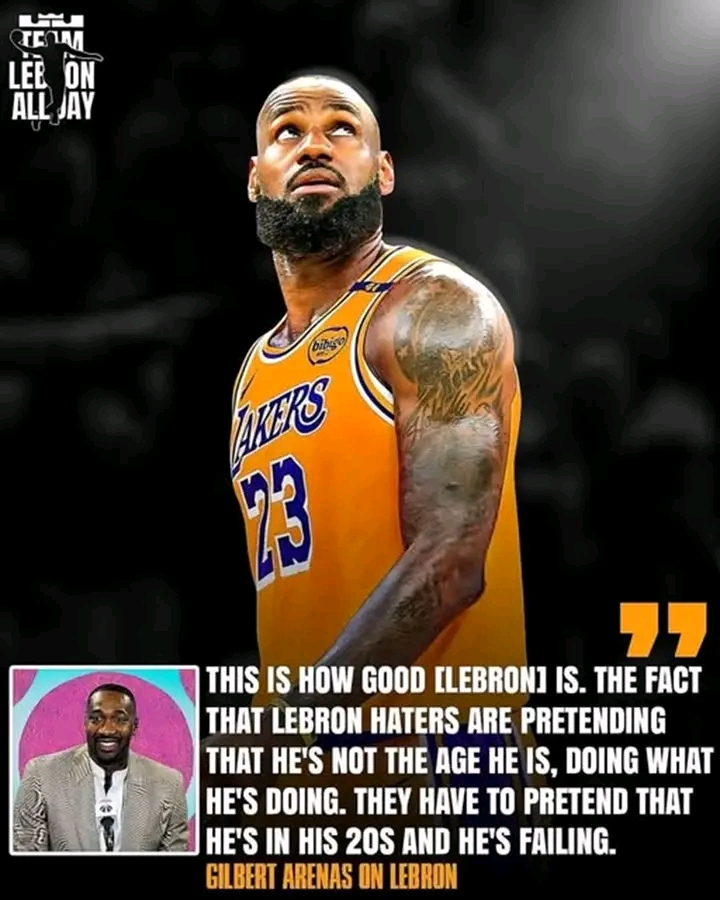LeBron James turned 40—and he’s still redefining what greatness looks like in professional sports. In a league where most players retire in their early to mid-30s, LeBron continues to play at an elite level, proving that age is just a number when you’re built like a machine and fueled by relentless work ethic. For two decades, critics have tried every angle to discredit his legacy. Yet, year after year, game after game, LeBron James continues to make their arguments obsolete.
The Longevity Argument: He’s Not Just Hanging On—He’s Leading
It’s one thing to play until 40. It’s another thing to still matter. LeBron isn’t just filling a roster spot—he’s often still the best player on the court. Averaging over 25 points per game deep into his late 30s, he remains a central force on his team, setting the tone on both ends of the floor. No one in NBA history has combined peak longevity, production, and versatility quite like LeBron.
Critics often bring up the natural decline of aging stars, but LeBron seems to have found a cheat code. His commitment to fitness, recovery, and evolution in play style has allowed him to transition seamlessly from high-flying phenom to basketball savant. He’s still out-thinking and outplaying defenders half his age.
The “Not a Killer” Myth Falls Apart
For years, detractors have clung to the idea that LeBron isn’t a “killer” like Jordan or Kobe. Yet he’s racked up more clutch shots than many of his so-called peers. He’s hit playoff buzzer-beaters, led epic comebacks, and most importantly, he makes the right basketball play, even if that means passing to an open teammate.
What’s often mistaken for passivity is actually elite basketball IQ. He doesn’t chase glory—he chases wins. And with four championships, 10 Finals appearances, and counting, the results speak louder than the noise.
The Rings Debate: It’s Time to Move On
Yes, Jordan has six rings. Yes, Kobe has five. But if titles are the only metric, Bill Russell wins with 11. The truth is, championships are a team accomplishment. LeBron has led three different franchises to titles—something neither Jordan nor Kobe ever did. He’s adapted to different systems, teammates, and coaches, and he’s done it in an era with unprecedented parity and competition.
His 2016 Finals performance—leading the Cavaliers back from a 3–1 deficit against a 73–9 Warriors team—remains one of the greatest accomplishments in sports history. You can’t erase that with ring math.
Off the Court: The Role Model They Don’t Talk About Enough
LeBron’s excellence extends far beyond basketball. He’s never had a major scandal. He opened a school for at-risk youth. He’s been a vocal advocate for social justice. He’s a successful businessman, producer, and philanthropist. When people talk about role models in sports, LeBron is the blueprint. The hate often says more about the haters than the man himself.
The Bottom Line: History Will Be Kind to the King
Critics will always exist, and for someone as transcendent as LeBron James, the scrutiny has always been disproportionate. But facts are stubborn. He’s the NBA’s all-time leading scorer. He’s top-five in assists. He’s redefined longevity and shattered records with consistency and class. Even at 40, he’s still altering the landscape of the league.
So, to the doubters: you’ve had 20 years. You’ve tried the rings argument, the killer instinct narrative, the flopping criticisms, the superteam complaints—and yet, LeBron James continues to thrive, evolve, and dominate.
He’s not just still here. He’s still better than most.
And that’s why you keep losing the argument.

